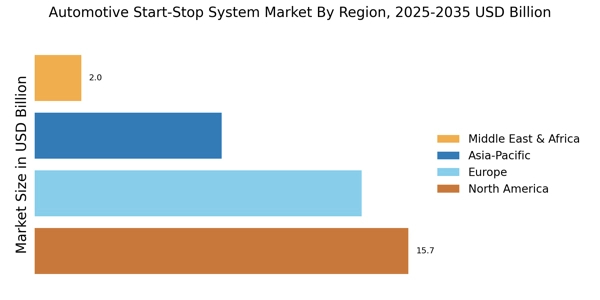Rise of Electric and Hybrid Vehicles
The Automotive Start-Stop System Market is being positively influenced by the rise of electric and hybrid vehicles. As the automotive landscape shifts towards electrification, manufacturers are increasingly integrating start-stop systems to optimize energy usage and enhance overall vehicle efficiency. These systems are particularly beneficial in hybrid vehicles, where they can help manage the transition between electric and gasoline power, thereby improving fuel economy. Market analysis indicates that the hybrid vehicle segment is expected to grow significantly, with projections suggesting that hybrid and electric vehicles will account for over 40% of new vehicle sales by 2030. This shift not only supports the adoption of start-stop technology but also aligns with broader environmental goals, making it a key driver for the automotive start-stop system market.
Regulatory Influence on Emission Standards
The Automotive Start-Stop System Market is significantly shaped by stringent regulatory frameworks aimed at reducing vehicular emissions. Governments worldwide are implementing stricter emission standards, compelling automotive manufacturers to adopt technologies that minimize fuel consumption and greenhouse gas emissions. For example, regulations such as the Euro 6 standards in Europe and similar initiatives in other regions are pushing manufacturers to integrate start-stop systems into their vehicles. This regulatory pressure is expected to drive the market, as vehicles equipped with start-stop technology can achieve substantial reductions in CO2 emissions, often exceeding 5% in urban driving conditions. As compliance with these regulations becomes increasingly critical, the demand for advanced start-stop systems is likely to rise, further propelling market growth.
Consumer Demand for Enhanced Fuel Efficiency
The Automotive Start-Stop System Market is witnessing a notable shift in consumer preferences towards vehicles that offer enhanced fuel efficiency. As fuel prices continue to fluctuate, consumers are increasingly seeking vehicles that can deliver better mileage and lower operating costs. Start-stop systems play a crucial role in this context, as they can improve fuel economy by up to 10% in city driving scenarios. This growing consumer demand is prompting manufacturers to incorporate start-stop technology into a wider range of vehicles, including compact cars and SUVs. Market data indicates that vehicles equipped with start-stop systems are becoming more prevalent, with an estimated 30% of new vehicles featuring this technology in 2025. This trend suggests that the automotive industry is responding to consumer expectations for sustainability and cost-effectiveness, thereby driving the growth of the start-stop system market.
Cost Reduction Strategies in Automotive Manufacturing
The Automotive Start-Stop System Market is also influenced by manufacturers' ongoing efforts to reduce production costs while maintaining quality. As competition intensifies, automotive companies are seeking ways to streamline their manufacturing processes and incorporate cost-effective technologies. Start-stop systems, which can be integrated into existing vehicle architectures with relative ease, present a viable solution for manufacturers looking to enhance vehicle efficiency without incurring substantial additional costs. Furthermore, the decreasing prices of components such as batteries and electronic control units are making it more feasible for manufacturers to adopt start-stop technology across various vehicle segments. This trend is expected to contribute to a broader acceptance of start-stop systems, thereby driving market growth as manufacturers aim to meet consumer demands for efficiency and sustainability.
Technological Advancements in Automotive Start-Stop Systems
The Automotive Start-Stop System Market is experiencing a surge in technological advancements that enhance vehicle efficiency and performance. Innovations such as improved battery technology and advanced control algorithms are being integrated into start-stop systems, allowing for seamless operation and reduced energy consumption. For instance, the introduction of lithium-ion batteries has significantly improved the reliability and efficiency of these systems. As a result, the market is projected to grow at a compound annual growth rate (CAGR) of approximately 8% over the next five years. This growth is driven by the increasing adoption of electric and hybrid vehicles, which often incorporate start-stop technology to maximize fuel efficiency and reduce emissions. Consequently, manufacturers are investing heavily in research and development to create more sophisticated systems that meet evolving consumer expectations.

















